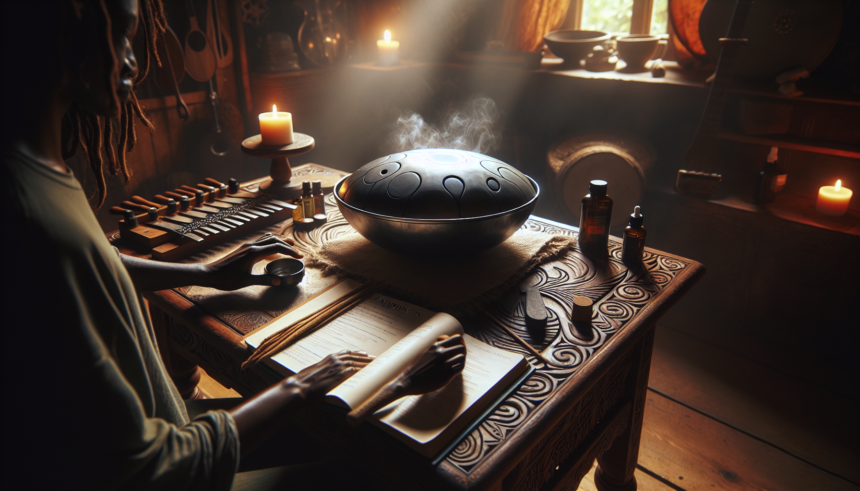<!DOCTYPE html>
<html lang="en">
<head>
<meta charset="UTF-8">
<meta name="viewport" content="width=device-width, initial-scale=1.0">
<title>Handpan Longevity</title>
</head>
<body>
<header>
<h1>Handpan Longevity: Expert Advice for Long-Lasting Performance</h1>
</header>
<main>
<section>
<h2>Introduction</h2>
<p>The melodious and ethereal sound of the handpan has captured the hearts of musicians and listeners worldwide. As these instruments gain popularity, ensuring their longevity becomes crucial for both enthusiasts and professional players. Like any musical instrument, handpans require proper care and maintenance to retain their pristine condition and distinctive sound. This article delves into expert advice on how to maintain your handpan for long-lasting performance, covering daily care routines, storage tips, and long-term maintenance strategies.</p>
</section>
<section>
<h2>Understanding Your Handpan</h2>
<p>Before discussing handpan maintenance and longevity, it's essential to understand the instrument's composition and structure. Typically made from steel, handpans are tuned to produce specific notes when struck. The surface consists of multiple dings and dimples, each representing a different note. While their steel structure offers durability, it's also susceptible to factors like moisture, temperature changes, and physical impacts, which can affect its lifespan and sound quality.</p>
</section>
<section>
<h2>Daily Care and Maintenance</h2>
<p>Establishing a routine for daily care is pivotal for maintaining the handpan's sound quality and structural integrity. Here are some expert tips:</p>
<ul>
<li><strong>Clean Regularly:</strong> After each use, wipe the handpan with a microfiber cloth to remove fingerprints, dust, or any pollutants. Avoid abrasive materials that could scratch the surface.</li>
<li><strong>Avoid Harsh Chemicals:</strong> Use mild soapy water for cleaning if necessary, but ensure it is fully dried after rinsing. Avoid using alcohol or heavy solvents, which can damage the coating and metal.</li>
<li><strong>Proper Handling:</strong> Hold the handpan by its rim rather than the playing surface to prevent building up unwanted oils or dirt on the notes.</li>
<li><strong>Check for Damages:</strong> Regularly inspect your handpan for any signs of damage or color changes, which could indicate corrosion or the beginning of structural problems.</li>
</ul>
</section>
<section>
<h2>Storage for Longevity</h2>
<p>Proper storage is as crucial as regular cleaning when it comes to extending your handpan's lifespan. Here is some storage advice from experts:</p>
<ul>
<li><strong>Climate Control:</strong> Store your handpan in a place with stable temperature and humidity. Extreme conditions can cause the material to expand, contract, or rust.</li>
<li><strong>Avoid Direct Sunlight:</strong> Continuous exposure to sunlight can weaken the surface and cause discoloration, so it's vital to keep the instrument in the shade.</li>
<li><strong>Use a Handpan Case:</strong> Invest in a robust, padded handpan case to protect it from physical damage, especially when transporting it from one place to another.</li>
<li><strong>Storing Position:</strong> Place the handpan on a dedicated stand or a cushioned surface to prevent any pressure on the notes, which could distort its sound.</li>
</ul>
</section>
<section>
<h2>Long-term Maintenance Strategies</h2>
<p>To ensure the handpan continues to perform excellently over extended periods, implement the following long-term maintenance methods:</p>
<ul>
<li><strong>Regular Tuning:</strong> Over time, a handpan may lose its perfect pitch due to environmental effects or general wear and tear. Schedule periodic tuning with a professional tuner to retain its melodic balance.</li>
<li><strong>Corrosion Prevention:</strong> Apply protective oils, such as coconut or mineral oil, to the surface periodically to create a barrier against moisture and oxidation.</li>
<li><strong>Consult Experts:</strong> If you suspect damage or functional issues, seek immediate assistance from a handpan expert rather than attempting repairs yourself, which could cause further harm.</li>
<li><strong>Rotation of Use:</strong> If you own multiple handpans, rotate their use to reduce wear on a single instrument, allowing each handpan to rest and recover from vibrational stress.</li>
</ul>
</section>
<section>
<h2>The Role of Environment in Handpan Longevity</h2>
<p>The environment in which a handpan is played and stored significantly impacts its longevity. Musicians in humid or saltwater locations, for example, must be extra cautious about rust prevention. Utilizing a dehumidifier in storage areas or choosing handpans made from stainless materials may offer extra protection against environmental damage.</p>
<p>During travel, try to minimize exposure to fluctuating temperatures, and never leave your handpan in a car for extended periods, especially during hot or cold seasons.</p>
</section>
<section>
<h2>Troubleshooting Common Handpan Issues</h2>
<p>Despite meticulous care, handpans can still encounter issues. Here are solutions to some common problems:</p>
<ul>
<li><strong>Stuck Notes:</strong> This could be due to foreign particles on the surface. Gently clean the area and test each note.</li>
<li><strong>Rust Spots:</strong> Light rust can be removed with a gentle rub using a fine-grade steel wool followed by oiling. Severe rust may need professional assessment.</li>
<li><strong>Detuned Notes:</strong> If notes have drifted from their intended pitch, consult a professional tuner to restore its sonic harmony.</li>
</ul>
</section>
<section>
<h2>Conclusion</h2>
<p>Handpans are an exquisite blend of craftsmanship and musicality, requiring diligent care to preserve their ethereal voice. By adhering to a strict regime of cleaning, storing correctly, and regular maintenance, musicians can ensure their handpans remain in pristine condition for years. As handpan users invest time in understanding and adopting these practices, they not only extend their instrument’s lifetime but also ensure continued joy from its unique and resonant sound.</p>
</section>
<section>
<h2>FAQs</h2>
<ol>
<li><strong>How often should I oil my handpan?</strong><br>
Oiling your handpan every 3-6 months is advisable, though this may vary based on environmental conditions and usage frequency.</li>
<li><strong>Is it safe to perform DIY tuning on my handpan?</strong><br>
DIY tuning is not recommended as it requires precise skills. It's best to leave tuning to professional handpan tuners.</li>
<li><strong>What should I do if I notice rust on my handpan?</strong><br>
Remove any light rust with fine-grade steel wool and protect the area with oil, but for significant rust issues, seek professional help.</li>
<li><strong>Can I play my handpan outdoors?</strong><br>
Yes, but limit exposure to direct sunlight or adverse weather conditions, and ensure it is cleaned and dried afterward to prevent damage.</li>
<li><strong>What is the average lifespan of a handpan?</strong><br>
With proper care and maintenance, a handpan can last for decades, though this depends on the quality of materials and frequency of use.</li>
</ol>
</section>
</main>
</body>
</html>Handpan Longevity: Expert Advice for Long-Lasting Performance

Leave a comment




